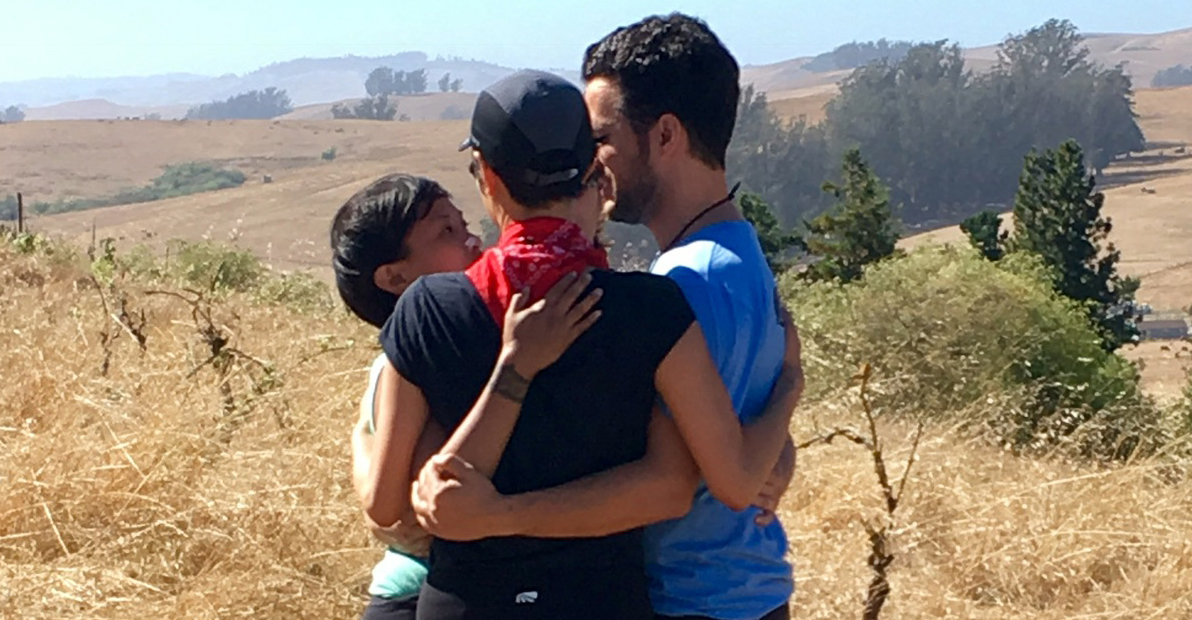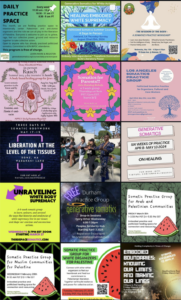Somatics, Trauma, & Resilience

Somatics, Trauma, & Resilience
This course is designed for politicized healers, organizers, and movement builders to engage in their own healing, learning, and embodied transformation.
About This Course
In Somatics, Trauma, & Resilience (STR), politicized healers (coaches, therapists, and other one-on-one practitioners) begin or deepen the study and practice of somatics. For organizers and movement builders, STR is an opportunity to turn inward and engage with the impact of trauma and oppression, in order to look outward again, renewed, reenergized, and hopeful.
We will prioritize STR applicants who work in movements that (1) fight for freedom from political repression and state violence (including criminalization, militarization, surveillance, imprisonment, policing, etc.) and (2) build scalable alternatives (such as transformative justice); and (3) create climate and environmental justice (including just transition, land sovereignty, environmental racism, etc).
STR is an opportunity to deepen your own healing and transformation in a community of people committed to social justice. Beginners in STR learn gs’s core theories, practices, and processes. For those applying for a second year of STR, it is an opportunity to continue your healing and transformation, as well as to support others’ work. Regardless of experience, all participants explore how trauma and oppression “shape” us, individually and collectively, and how we can “re-shape” ourselves through somatics awareness, cultivating resilience, healing, and developing new practices.
Program Details
- STR consists of five sessions (alternating between 3 and 4 days) with a total of 18 days. Each session builds upon the one before it. Participants are expected to attend all five sessions fully.
- STR is taught through presentation and modeling, and facilitated discussion. It is highly participatory and experiential. Participants learn theory, somatic practices and processes, give and receive ongoing feedback, and engage in your own healing process. Between sessions we ask you to commit to daily somatic practices, reading, writing and discussion/reflection with other students.
- Senior students (second-year students) have the option to work with practice clients for the duration of the course. By working 1:1 with a practice client, you get the opportunity to apply the skills you are learning. We ask that you work with practice clients who work in social/environmental justice movements, enabling them to get access and exposure to somatic work. You will have an outline to guide practice client sessions and will be supervised by STR teachers and gs staff.
Participants in STR learn to:
- Recognize and work with the impacts of trauma and oppression with a holistic view—in our psychobiology, our cares and concerns, our actions and reactions, and in our relationships and leadership style. This includes seeing dissociation, numbing, hypervigilance, lack of boundaries, control, and physiological “armoring,” all as intelligent responses to violation
- Create more effective boundaries that can help regenerate a sense of safety, protection, allyship, and choice in the wake of trauma and ongoing oppression
- Give and receive somatically-grounded feedback—“somatic assessments”—that can forward your and other people’s healing and leadership goals
- Be more present amidst deep emotion, both your own and other people’s, including grief, rage, and fear
- Discover and draw on the resilience in yourself and the people you work with
- Work with your own history of trauma and oppression, as well as shaping from power and privilege, and develop it as a resource in your own work
- Learn to take care of and resource yourself as a practitioner or organizer who interacts with personal and social trauma intimately.
Is This Course for Me?
You are a good fit for STR if you are looking to:
Deepen in your path of healing and embodiment through an exploration of how trauma and the impacts of oppression impact your life and leadership
Understand and cultivate resilience in your life, organizing, and leadership
Build your skills in supporting others in their healing and transformation. This includes a desire to be a somatic practitioner/coach, join the gsPN (gs Practitioners Network,) and more effectively support movement leaders
Apply your understanding of trauma and healing in your organizing, campaigns and more; and
Experience more choice and freedom in your relationships and leadership
Embodiment of somatics takes time—includes days in training, daily practice, good models, and individualized support. You can think of somatics more like a martial art than a theory and/or a set of “tools.” STR is an entry-point to a path of transformation, the beginning of the marathon.
STR is not a training-for-trainers. We do not teach somatics so that you can then pass it on to your clients, colleagues, or members. Instead, STR is designed to support individuals to build embodied leadership to align our personal and collective practices with our principles, and to heal from trauma and internalized oppression for the sake of strengthening social and environmental justice.
If you are interested in developing competence to offer somatics to other groups or individuals (through teaching or as a practitioner), we invite you to talk with gs staff after your first year of training to design a learning path.
No prerequisites. This is a 5-session course so when you apply you are agreeing to attend all days of all sessions.
Please fill out the application for the Somatics, Trauma, & Resilience course here. Deadline to apply is January 2, 2020. Application results, regardless of status, will be emailed by March 2020.
We tend to have more applicants than spaces available in our courses. Our commitment is to prioritize folks who are committed to the intersections of personal and social transformation and that are organizing to fight for freedom from political repression and state violence, and for environmental and climate justice.
Session 1: April 23-26; Oakland, CA
Session 2: June 11-14; Oakland, CA
Session 3: July 30 – August 2; Oakland, CA
Session 4: September 23-26; Petaluma, CA
Session 5: November 19-22; Oakland, CA
Please note that we require you to participate in all days of all sessions of the course. This helps to build lasting change and practice.
$4350
Please note that the Program Fee DOES NOT include travel, lodging, or lunch and dinner. The Program Fee DOES include light breakfast and refreshments throughout the day.
We are committed to making sure that money is not a barrier to participation. We are committed to economic justice and to challenging white supremacy, capitalism, ableism, and all systems of oppression in every aspect of our work. As part of that, we have a commitment to making our programs accessible and affordable to poor and working class people and people of color who are on the frontlines of social and environmental justice movements.
We are committed to making sure that money is not a barrier to participation.
Course Fee Structure & Sliding Scale 2020.
Thank you for your interest and for all the ways you support us!
Please consider making a donation to us for the sake of making our programs accessible to innovative movement leaders, to poor and working class communities, and communities of color. All donations go a long way for us and no amount is too small to have an impact.
gs Stories
Be a part of gs!
Get involved with Transformative Resourcing—an embodied and values-aligned way to contribute and fundraise.



Recent Comments